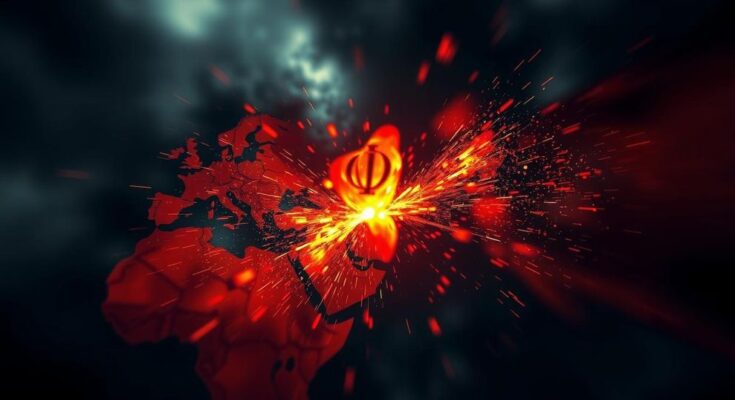The Middle East crisis has intensified with threats from Iran’s supreme leader against Israel and the US, following drone attacks on Israel by Iraqi pro-Iran groups and severe Israeli airstrikes in Lebanon and Gaza, leading to many casualties. The potential collapse of UNRWA’s operations heightens the humanitarian risk for Palestinians in Gaza and the West Bank. Diplomatic efforts for a ceasefire are underway yet face many challenges amid escalating violence.
The ongoing Middle East crisis has escalated significantly with a series of violent exchanges involving Iran, Israel, and various militia groups throughout the region. The Iranian supreme leader, Ayatollah Ali Khamenei, has issued stern warnings against Israel and the United States, threatening a “crushing response” to their actions. This statement follows reports of drone attacks by pro-Iranian groups in Iraq directed at Israeli targets, as well as an increase in rocket fire from Lebanon into Israel. Simultaneously, Israeli airstrikes in Lebanon and Gaza have resulted in tragic casualties and injuries. The Lebanese health ministry reports that at least fifty-two individuals were killed due to Israeli bombing, coupled with injuries to numerous others from rocket attacks originating from Lebanon. Israeli authorities claimed that multiple projectiles were intercepted before reaching their intended targets, though the situation remains highly volatile. The humanitarian circumstances in Palestinian territories are dire, particularly within the Shuafat refugee camp, where a deteriorating sanitation system exacerbates the challenges faced by residents. The recent legislation passed by the Israeli parliament to limit the operations of the United Nations Relief and Works Agency for Palestine Refugees (UNRWA) raises significant concerns regarding the future of humanitarian aid for both Gaza and the West Bank. Dr. Maya Rosenfeld, a sociologist at the Hebrew University of Jerusalem, stated that there is currently no viable alternative to UNRWA, emphasizing its essential role in providing necessary services amid the ongoing crisis. Meanwhile, diplomatic efforts by the Biden administration are underway, aiming for a temporary ceasefire in light of the escalating violence, though success remains uncertain.
The Middle East crisis continues to unfold with significant implications for regional stability. The tensions have intensified recently, with Iran asserting its influence through threats toward Israel and the United States. The pro-Iranian militias in Iraq have engaged in drone strikes against Israeli interests, reflecting a growing willingness to confront Israeli military actions. Meanwhile, Israel has intensified its aerial operations in both Lebanon and Gaza, resulting in high casualty figures and worsening humanitarian conditions. The strained relationship between Israel and the UN, particularly regarding UNRWA, complicates the humanitarian landscape, heightening fears of an impending collapse of essential services for millions of Palestinians, thereby worsening the current crisis.
The escalation of violence in the Middle East, highlighted by Iran’s threats and increased Israeli military action, presents a grave scenario that could lead to broader conflict. The humanitarian crisis resulting from these tensions is deeply concerning, with millions at risk of losing essential services due to the actions of the Israeli government against UNRWA. Without a resolution to the ongoing violence and intervention from the international community, the situation is poised to worsen significantly in the coming days and weeks.
Original Source: www.theguardian.com




